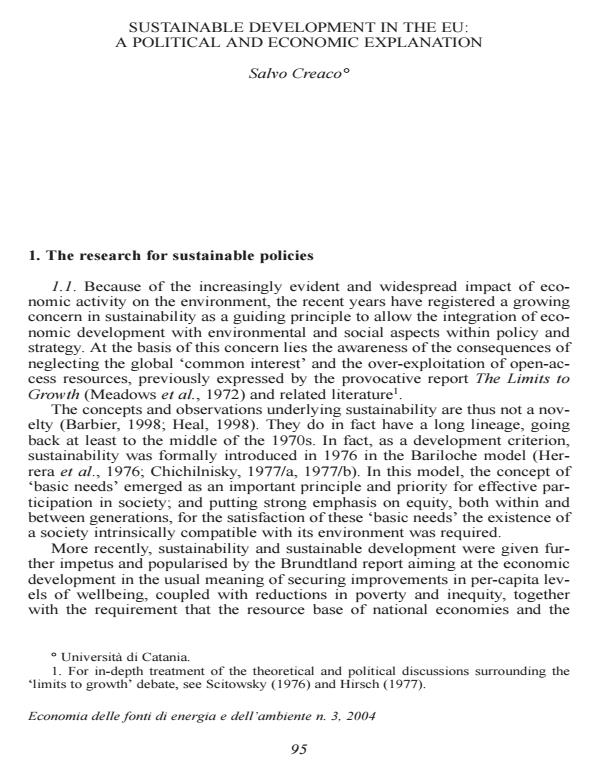Sustainable development in the EU: a political and economic explanation
Titolo Rivista ECONOMIA DELLE FONTI DI ENERGIA E DELL’AMBIENTE
Autori/Curatori Salvo Creaco
Anno di pubblicazione 2006 Fascicolo 2004/3
Lingua Inglese Numero pagine 25 P. Dimensione file 131 KB
DOI
Il DOI è il codice a barre della proprietà intellettuale: per saperne di più
clicca qui
Qui sotto puoi vedere in anteprima la prima pagina di questo articolo.
Se questo articolo ti interessa, lo puoi acquistare (e scaricare in formato pdf) seguendo le facili indicazioni per acquistare il download credit. Acquista Download Credits per scaricare questo Articolo in formato PDF

FrancoAngeli è membro della Publishers International Linking Association, Inc (PILA)associazione indipendente e non profit per facilitare (attraverso i servizi tecnologici implementati da CrossRef.org) l’accesso degli studiosi ai contenuti digitali nelle pubblicazioni professionali e scientifiche
Sustainable development in the EU: a political and economic explanation (by Salvo Creaco) - ABSTRACT: Seeking to identify the principal actions needed to make sure that the process towards sustainability be given a much wider impulsion, the Fifth Environmental Action Programme of the EU underlined the increasing need for the application of a broader range of instruments aimed at influencing decisions which affect the environment. In this perspective economic tools were seen as the most adequate and powerful instruments available for efficient use and management of natural resource base in addition to and complementary not only to direct regulations but also to social pressure, negotiation and other forms of moral suasion. Thus, at the beginning of the 1990s, the European environmental policy began a transformation from merely growth-oriented model to sustainable development, moving into its second stage of environmental agenda. Widening the portfolio of policy instruments represents a main aspect of the Sixth Environmental Action Programme as well. In the search for innovative and sustainable solutions to the problems of the internalisation of the negative as well as positive impacts of production and consumption patterns on the environment, the new Programme requires, inter alia: encouraging reforms of subsidies that have considerable negative effects on the environment and are incompatible with sustainable development; analysing the environmental efficiency of tradable environmental permits as a generic instrument and of emission trading with a view to promoting and implementing their use where feasible; promoting and encouraging the use of fiscal measures such as environmentally related taxes and incentives, at the appropriate national or Community level; promoting the integration of environmental protection requirements in standardisation activities. In order to analyse whether the process towards sustainability started in 1992 has taken roots, several evaluation studies revealed that broadening the range of instruments had proved to be more difficulty than envisaged when the recent European environmental policy was adopted. With the inevitable consequence that the most common environmental policy solution had frequently continued to be direct regulations. The scant progress in widening the range of instruments for control and behavioural change confirms the existence of a large disagreement between the normative prescriptions of economic theory and decisions effectively taken within the political process. If a large divergence between theory and practices often prevails, the relevant issue is then to understand why EU and Member States have failed to refer to the proposed wider box of instruments. In this direction, this paper points out the usefulness of the contribution that public choice theory can provide for understanding why particular environmental instruments are actually adopted and implemented. According to the individualistic approach of public choice, the paper deals with the issue concerning the choice and implementation of environmental policy tools through the analysis of the functioning of two strictly connected markets: the political market and the para-political market, and tries to give an explanation as to why in representative democracies, in which forces may be identified as demand and supply, an incentive-oriented environmental policy has many difficulties of being implemented.
Salvo Creaco, Sustainable development in the EU: a political and economic explanation in "ECONOMIA DELLE FONTI DI ENERGIA E DELL’AMBIENTE" 3/2004, pp , DOI: